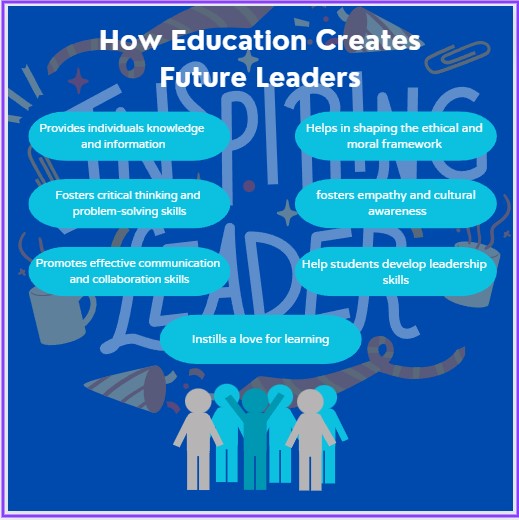Power Of Education: Educating the Leaders of Tomorrow
Education is not limited to learning facts, but the training of the mind to think and explore. The main purpose of education is to develop and grow the student for a fulfilled life. For a parent, it is very important to choose the best school for their child and the parents expect that the school for their child is not just limited to only academics but every aspect of learning whether it is sports or art, or dance. That’s where The Manthan School, the best school near gaur city, fills the gap to provide the best and world-class education along with all the necessary learning to prepare your child to be a future leader.
How Education Creates Future Leaders
Education plays a crucial role in shaping future leaders. It equips individuals with the knowledge, skills, and values necessary to lead and make a positive impact on society. Here are some ways in which education contributes to the development of future leaders:
Knowledge and Information: Education provides individuals with a broad range of knowledge and information about various subjects, including history, science, literature, and more. This knowledge helps leaders understand the world, its challenges, and potential solutions. It allows them to make informed decisions and develop a comprehensive understanding of complex issues.
Critical Thinking and Problem-Solving Skills: Education fosters critical thinking and problem-solving skills, which are essential for effective leadership. It encourages individuals to analyze situations, evaluate different perspectives, and develop innovative solutions. Through education, future leaders learn to think critically, ask insightful questions, and approach problems with a systematic and analytical mindset.
Communication and Collaboration: Education promotes effective communication and collaboration skills. Future leaders need to articulate their ideas, express their thoughts clearly, and actively listen to others. Education provides opportunities for group projects, discussions, and presentations, which enhance interpersonal and communication skills. These skills are vital for building relationships, influencing others, and leading diverse teams.
Ethical and Moral Development: Education helps in shaping the ethical and moral framework of individuals. It exposes them to various values, ethics, and principles. By exploring moral dilemmas, engaging in discussions about ethics, and examining real-world examples, students develop their own sense of ethics and integrity. Future leaders with a strong moral compass are more likely to make ethical decisions, act responsibly, and inspire trust.
Empathy and Cultural Awareness: Education fosters empathy and cultural awareness by exposing individuals to different perspectives, cultures, and experiences. It helps future leaders develop a global mindset and understand the interconnectedness of the world. By promoting empathy, education enables leaders to appreciate diversity, embrace inclusivity, and make informed decisions that consider the needs and perspectives of various stakeholders.
Leadership Development: Education often incorporates leadership development programs, extracurricular activities, and opportunities for personal growth. These initiatives help students develop leadership skills such as decision-making, adaptability, resilience, and emotional intelligence. Through participation in student organizations, clubs, and community service, individuals can practice and refine their leadership abilities, preparing them for future leadership roles.
Lifelong Learning: Education instills a love for learning and encourages individuals to be lifelong learners. Future leaders must be adaptable and open to acquiring new knowledge and skills throughout their lives. Education provides the foundation for continuous personal and professional growth, enabling leaders to stay updated, embrace innovation, and navigate rapidly changing environments.
Skills Required To Become A Future Leader
Young learners aspiring to become future leaders should develop a robust set of skills. These skills will empower them to navigate challenges, inspire others, and drive positive change. Key skills required for future leaders include:
Effective Communication: Future leaders must excel in articulating their ideas, listening actively, and conveying their thoughts clearly and persuasively.
Critical Thinking: The ability to analyze complex situations, evaluate information, and make informed decisions is crucial for leadership.
Problem Solving: Leaders should be adept at identifying issues, brainstorming solutions, and implementing strategies to overcome obstacles.
Adaptability: The world is constantly evolving. Future leaders need to be adaptable, open to change, and capable of adjusting their approaches when necessary.
Teamwork: Collaboration is a cornerstone of leadership. Young learners should learn to work well with diverse teams, valuing different perspectives and leveraging collective strengths.
Empathy: Leaders who can understand and connect with others on an emotional level can build strong relationships, foster trust, and motivate their teams effectively.
Resilience: The ability to bounce back from setbacks and maintain composure under pressure is vital for leadership success.
Time Management: Leaders often have demanding schedules. Learning to manage time efficiently is essential to balance responsibilities effectively.
Creativity: Innovation and creative thinking are key for finding unique solutions to challenges and driving progress.
Ethical Decision-Making: Future leaders should have a strong moral compass and make ethical choices, even when faced with difficult dilemmas.
Global Awareness: In our interconnected world, leaders should be aware of global issues and cultural diversity, fostering a broader perspective.
Leadership Presence: Confidence, self-assuredness, and the ability to inspire trust in others contribute to a strong leadership presence.
Continuous Learning: Leaders should never stop learning. A commitment to self-improvement and staying updated with industry trends is vital.
Responsible Leadership: Young learners should understand the impact of their decisions on their teams, organizations, and society as a whole.
By cultivating these skills, young individuals can prepare themselves to be effective and ethical leaders who can drive positive change in their communities and beyond.
Conclusion
The Manthan School is among the top 10 schools in Delhi NCR that are training today’s young minds for a bright tomorrow. The school engages its students in every learning opportunity to widen their thinking perspective. Apart from world-class academics, various skills such as life skills, foreign language, art, martial arts, dance, music, theatre, and much more are included in the school curriculum to evolve the skills of the students.
The Manthan School lays great emphasis upon reading culture, conceptual understanding, original thinking, self-answering skills, original writing, enriched vocabulary, fluency in communication skills, creativity, self-responsibility, self-discipline, self-confidence, and leadership skills, to enhance the overall personality of the students. Also, the School provides a world-class infrastructure along with a positive and nurturing learning environment to enrich the learning experience of young minds. So, enroll your child at The Manthan School, Greater Noida West, and be ready to see your child as a future leader.

